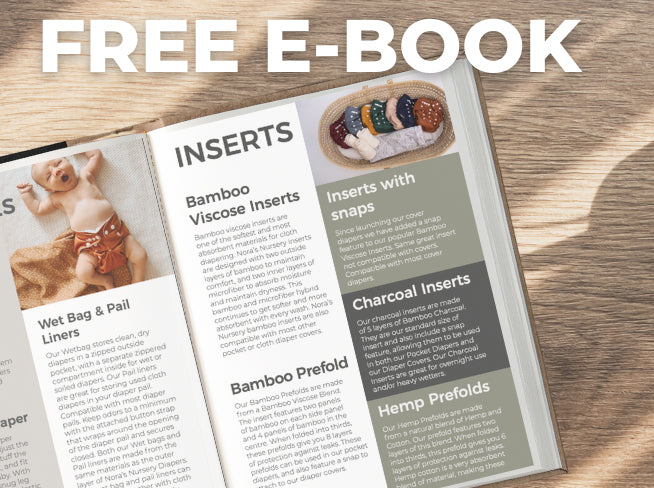|
1 Washing with cold water. |
To properly clean and sanitize your diapers they must be washed on a normal warm/hot water cycle (water less than 115°F) and tumbled tried on a low heat/ delicate cycle or in direct sunlight (which sterilizes with UV). The pre-rinse can be with cold water, but the main wash must be hot enough to disinfect! Read up on our washing 101 to learn the basics of washing. |
|
2 Not using the pocket. |
Although it may work for some to lay the insert directly onto the diaper, it isn’t ideal. The function of a pocket diaper is best when inserted into the pocket. For extra protection, an additional insert to the one in the pocket can be laid on top of the diaper for overnight use or heavy-wetters. |
|
3 A short stash. |
When deciding to cloth diaper full time it’s important to have enough diapers to get you through the day, or two. While washing and preparing dirty diapers you will need to have a few extra on hand as laundry may take a few hours. A larger stash of diapers is especially important when planning on cloth diapering from newborn through to potty-training as you want to make sure you are not over using (wearing & washing, repeat!) a few diapers as they will quickly wear out. |

|
4 Essential Oils. |
Whether you’re adding oils to the wash or using them directly on the diaper, the oil residue will eventually cause your precious cloth to become water-repellent instead of absorbent. If using oils such as tea tree for their anti-bacterial purposes, it is best to instead practice a good washing routine, tackling bad bacteria with hot water & detergent. |
|
5 Expecting cloth diapers to look like disposables. |
Disposables are often very thin and narrow because they contain chemical crystals inside the fibers that swell only when wet. Cloth diapers instead do not change shape, they are designed to put absorbency where it is needed. Although cloth diapers tend to be a bit “fluffier” with cute patterns you’ll want to show them off! To see our newest collections click here. |
|
6 Using soap & not detergent. |
Soap is meant to be used on generally non-porous surfaces that have no nooks and crannies to trap soil. Detergent is formulated to work on cloth, a very porous and textured material, it is also formulated to trap soil and suspend it in water where it can be washed away. Soaps form a build-up in hard water and will not rinse away easily, jeopardizing the absorption of your diapers. Now that you’ve decided to ditch the soap, learn more about which detergents we recommend. . |

|
7 Using diaper creams that aren’t cloth safe. |
Traditional diaper creams are made to create a barrier on your baby’s bottom, and, guess what? They will also leave a barrier on your diapers, which will inhibit their absorption. Some common diaper cream ingredients that can cause staining, repelling, or odors and should be avoided are as follows: petroleum/petroleum jelly, paraffin, cod liver oil and calamine. Read up on our top 10 cloth diaper approved creams here. |
|
8 Using fabric softeners. |
The chemicals in fabric softeners will leave a residue in the fabric of your treasured cloth diapers which eventually causes the diapers to be water-repellent and hello, causing leaking! The scent and other chemicals in fabric softener can also cause diaper rash and irritation to babies with sensitive skin. |

|
9 Not washing frequently. |
Diapers that sit in a pail for more than a day will begin to smell, will take longer to disinfect & clean, and develop stains. Not cute! Additionally, ammonia can begin to build causing additional odors as well as create an irritation and rash. Even when having a larger diaper stash, it’s important to make sure dirty diapers are cleaned as quickly as possible. |
|
10 Not changing frequently. |
Because cloth diapers don’t contain any chemically absorbent gels like disposables, your baby can recognize the feeling of wetness. This is great news when beginning to learn how to potty-train (read more about the benefits of cloth diapers when transitioning to potty-training) but it otherwise means you should be changing your baby frequently to keep them happy and dry. |



































